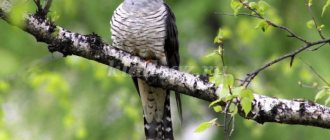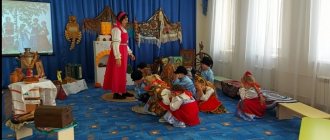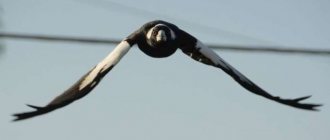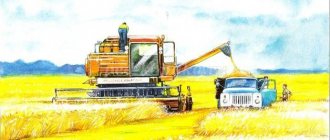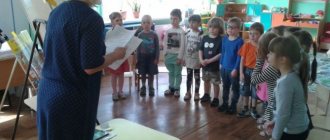Progress of the lesson
Introductory conversation with elements of theatrical performance
The teacher asks the children to take their seats, drawing their attention to the fact that an unusual envelope has appeared in the group from somewhere (which should be attached in advance in a visible place). The teacher reads the letter aloud. It says:
"Dear Guys! Autumn is writing to you. Help me please! Very soon my time will end, my sister Winter will replace me. I need to check the forests, fields, birds, animals. Did they all have time to prepare for the arrival of frosts, snowstorms, and cold? I can’t do everything alone, I need help! If you agree to become one, then I will send my faithful friend to you, he will explain everything.”
The children agree to help Autumn, and cheerful music begins to sound in the group. A Woodpecker bibabo doll appears on the screen, the toy says:
“Hello, girls and boys! I am so glad to meet you! Do you recognize me?
The teacher reads a trick riddle:
All day long in the forest I knock on all the trees. Doctor of the forest, but not a doctor. Did you guess it? I am…. (Children should not answer “rook”, but name another bird - woodpecker)
There are several more similar verses on the topic that could be used.
The doll continues the monologue: “Oh, how attentive and smart you are! We immediately guessed that this riddle was not about my friend the rook! Do you think it’s possible to see a rook in the forest now?”
The children answer, the teacher asks everyone to explain the answer.
Woodpecker: “That’s right, the rook has already flown to warm countries. We also need to remember other migratory birds that visit us only in the summer. This is what autumn asked me to ask you. Who do you know?
Ball game “Flying to warmer climes...”
All the children sit in a circle, the teacher takes the ball and says: “I know that the rook flew to warmer climes, but who do you remember?” The game continues as long as new names are heard.
The author Zatulina includes similar games in most of the notes for comprehensive classes on speech development in the senior group of kindergarten.
Lesson notes G.Ya. Zatulina
Woodpecker: “Oh, the little helpers worked hard! All my forest neighbors were remembered. That's right, they've all already flown away, the cold won't scare anyone. I’ll fly and say hello to Autumn from you, and tell you that we remembered all the migratory birds, and now we won’t be able to see any of them.”
The doll hides behind the screen.
Phys minute
The teacher invites everyone to stand up, repeating the words and movements after her (sequentially):
- The autumn rain is knocking: drip-drip, drip-drip! (we knock our feet softly on the floor).
- The sun is sleeping behind a cloud: bye-bye, bye-bye! (put your hands under your cheeks, sway from side to side).
- We have reaped the entire harvest: oh-oh, oh-oh! (Raises an imaginary load from the ground, raise it above your head).
- And they began to walk less often: br-rrrr, br-rrrr! (We hug ourselves with both hands, trembling).
A story about lovely birds based on a pictogram
The teacher draws the children's attention to the pictures she holds in her hands. She says:
“Guys, let's play an interesting game with you! These pictures contain clever icons that will help us teach about migratory birds. Let's try together! "
She shows the first picture and asks him to say what is drawn on it. Gradually all the pictures are posted on the board. The teacher takes out a card with a picture of a woodpecker and asks her to remember the riddle about him that she read at the beginning of the lesson. Everyone remembers the decoy poem together.
The teacher suggests talking about the bird using reference pictures and diagrams. Children take turns talking about the woodpecker (appearance, where it lives, what it eats, how it differs from other birds). The teacher reminds that the woodpecker is a wintering bird and can be found all year round. She asks the children to take one picture of migratory birds and tell about each one according to the diagram. Those who want to tell us.
Game “Which one has arrived?”
All cards with migratory birds are turned face down. She rises alone, at random. Children recognize the bird and name it (nightingale, rook, swallow, etc.). The teacher invites everyone to come up with a word that can be said about this bird (fast, swift, migratory, bright, motley). From time to time, the teacher helps the game by asking the question “Which one (which) flew/arrived to us…. swallow, starling, other migratory birds).
Riddle "The Fourth Wheel"
The teacher names four birds, three migratory and one wintering. For example: swallow, woodpecker, starling, thrush. Children must call the one that does not fly away to warmer climes for the winter “superfluous.”
You can find a list of similar logical tasks in the notes of classes on speech development in the senior group, devoted to other topics about birds.
All cards with birds are collected in an envelope that contained a letter from Autumn. Children say goodbye to them until next spring. The teacher asks them to recall the names of all the birds they collected and explain why they were given such a name.
Poetic pause
The teacher reads I. Tokmakova’s poem “Windy” and discusses it with the children. He asks everyone what he would draw in the picture for these lines. Several autumn pictures are hung on the board:
- early (September);
- golden (October);
- late (November).
Children are asked to identify the time of year that the poetess is talking about and the one outside the window now. The teacher asks to name the differences. She then suggests placing the pictures on the board in the correct order, from first to subsequent.
Game “Name it kindly!”
The teacher puts toy vegetables and fruits in an opaque bag. Invites each child to get one toy. Then the teacher calls out the words “vegetable” or “fruit” in turn and asks only those who are holding exactly what she just named to lift the toy.
After this, each student, in turn, must find an affectionate name for the “gift of autumn” that is in his hands. For example, a tomato is a tomato, an eggplant is an eggplant. The teacher suggests that almost all vegetables are easy to call affectionately, but fruits are more difficult.
Now two baskets are placed in front of the children. Everyone puts their toy either with vegetables or fruits. Then the contents of each basket are laid out on the table, then everyone looks for mistakes. If they are, then the fruits are laid out differently, correctly.
Tasks
- Enriching children's vocabulary.
- Teaching pupils how to write descriptive stories using reference cards (pictograms).
- Expanding ideas about the world around us, its main seasonal changes, plants, and living inhabitants.
- Formation in each child of social activity, the ability to express their own opinion, explain their point of view.
- General development of cognitive processes.
This summary on speech development in the senior group allows you to conduct a lesson that may be the final one for a block of autumn topics.

